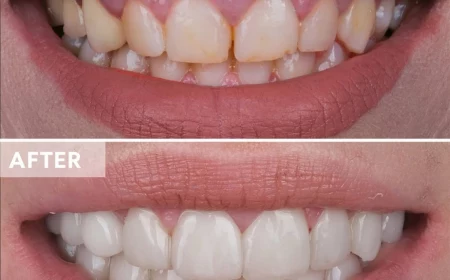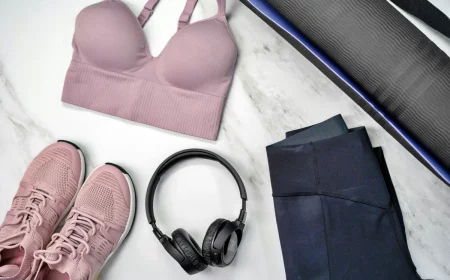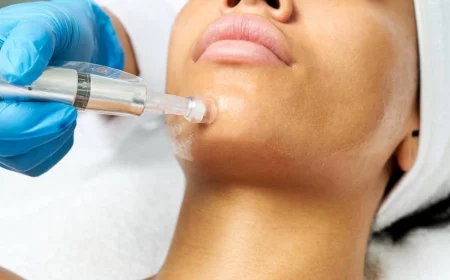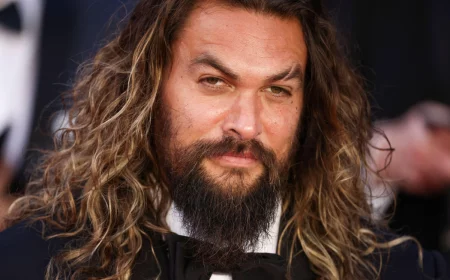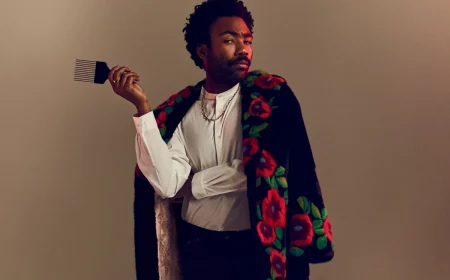Is Your Diet Thinning Your Hair? What the Pros Know
I’ve talked with so many people over the years who are worried about their hair thinning. It’s a tough spot to be in. They often show up feeling totally defeated, armed with a bag of pricey shampoos and supplements that haven’t done much. Most of them have been told it’s just their genes or stress acting up.
In this article
And while those things are definitely part of the puzzle, people are often shocked when I steer the conversation toward their lunch. The connection between what you eat and how healthy your hair is isn’t just a wellness trend; it’s straight-up biology. It’s a pattern I’ve seen play out again and again.
Let’s be real, though. Your diet is rarely the single cause of hair loss, but it’s a huge factor. It can hit the gas on a genetic tendency you already have, or in some cases, be the main reason for sudden shedding. My goal here isn’t to sell you a miracle cure, but to walk you through what really matters, based on what we know works. We’ll get into the foods that can sabotage your hair and, more importantly, why they do it. This way, you can make smart changes that actually build a solid foundation for healthy hair.

So, How Does This Even Work? A Peek Inside the Follicle
Before we start pointing fingers at certain foods, you need to know what you’re dealing with. Your hair follicle is a tiny, super-active little organ. In fact, the cells in your follicles are some of the fastest-dividing cells in your entire body. That high-energy lifestyle means they are incredibly hungry for nutrients and oxygen.
Think of it like this: when your body is running low on resources—either from a poor diet or from being stressed out—it goes into conservation mode. It starts cutting the budget for non-essential projects, and honestly, building hair is one of the first things to get sidelined.
Hair grows in a cycle, and understanding this cycle explains why that crash diet you did two months ago might be causing shedding now.
- The Growth Phase (Anagen): This is the main event, where your follicle is actively building the hair strand. It can last for years! A great diet keeps this phase going strong.
- The Transition Phase (Catagen): A very short phase, maybe a couple of weeks, where the hair follicle shrinks and detaches from its blood supply.
- The Resting Phase (Telogen): The follicle chills out for about 3 months, and then the hair sheds to make way for a new one. About 10-15% of your hair is in this phase at any time.
When you hit your body with a major stressor—like a nutrient deficiency or a ton of inflammation from a bad diet—it can shove a huge number of hairs from the growth phase straight into the resting phase. This leads to a type of shedding called telogen effluvium, where you see a noticeable increase in hair fall a few months after the trigger. It’s one of the most common forms of diet-related hair loss I see.

The Top Foods I See Causing Trouble
After looking at countless food journals, some clear patterns have emerged. When someone comes to me with thinning hair that isn’t easily explained by genetics, their diet almost always points to one or more of these culprits. It’s not about one “bad” meal; it’s the cumulative effect over time.
1. The Sugar & Refined Carb Trap
This is, without a doubt, the number one offender. I’m not talking about the natural sugar in a banana, which comes with fiber and vitamins. I’m talking about the processed sugars and simple carbs in things like soda, candy, pastries, white bread, and a ton of packaged snacks.
When you eat these, your blood sugar spikes, and your body releases a flood of insulin to manage it. Constantly high insulin is bad news for your hair. For one, it can ramp up the production of androgens (like DHT), the hormones that shrink hair follicles and lead to pattern baldness. Sugar also fuels body-wide inflammation, which is terrible for the delicate environment of your scalp.

And what about so-called “natural” sugars like honey or maple syrup? To be frank, your body largely treats them the same. While they might contain a few trace minerals, they still cause a significant insulin spike. It’s best to use them sparingly.
2. Alcohol’s Hidden Impact
A drink here and there is one thing, but regular or heavy drinking can really mess with your hair for a few reasons. First, alcohol is a diuretic, meaning it makes you flush out essential nutrients like zinc and B-vitamins—both critical for hair growth. It can also interfere with your body’s ability to build protein (and your hair is almost all protein!). Finally, it puts a major strain on your liver, which is responsible for balancing hormones and processing nutrients. When your liver is overworked, your hair often pays the price.
The key here is how much and how often. A glass of wine a couple of times a week probably isn’t the root of your problem. The issues start with daily drinking or regular bingeing that puts your system under constant stress.

3. The Wrong Fats & Fried Foods
The type of fat you eat really, really matters. The cheap vegetable oils (like corn, soy, and sunflower oil) used in most fast food, fried foods, and processed snacks are high in omega-6 fatty acids. While we need some omega-6, our modern diets have way too much of it compared to anti-inflammatory omega-3s. This imbalance creates a state of chronic inflammation that can harm hair follicles.
From my experience, people with inflammatory scalp issues often see a major improvement when they cut back on fried foods and processed oils and start eating more omega-3s from sources like fish, walnuts, and flaxseed. A calm scalp is a happy scalp.
4. The Mercury Issue in Some Fish
Okay, this one needs some nuance, because fish is generally fantastic for you. However, certain large, predatory fish accumulate high levels of mercury, a heavy metal that is toxic and a known cause of hair shedding. It’s not about avoiding fish; it’s about choosing the right kind.

Heads up! Health experts recommend limiting or avoiding high-mercury fish like swordfish, king mackerel, tilefish, and bigeye tuna. Instead, focus on low-mercury options that are packed with those amazing omega-3s. Think wild-caught salmon, sardines, cod, and canned light tuna. A quick tip: Canned light tuna (usually skipjack) is much lower in mercury than albacore (white) tuna. It’s a small detail that makes a big difference for your weekly tuna sandwich.
5. “Diet” Foods and Artificial Sweeteners
Switching to diet soda might seem like a smart move, but these products can sometimes cause their own problems. The main concern for me is the potential impact of artificial sweeteners on your gut microbiome—the trillions of bacteria living in your digestive system. Some research suggests these sweeteners can throw the balance of good and bad bacteria out of whack, leading to poor nutrient absorption and, you guessed it, inflammation. I’ve had many clients who reported less shedding after ditching their diet soda habit.

Building a Diet That Supports Your Hair
Avoiding the bad stuff is half the battle. Now you have to crowd it out with the good stuff! Here’s what to focus on.
Simple Swaps to Get You Started:
Instead of reaching for that can of sugary soda, try sparkling water with a fresh squeeze of lemon or lime. That morning muffin or pastry? Swap it out for two hard-boiled eggs or a cup of Greek yogurt for protein that will actually keep you full. And for lunch, instead of a sandwich on white bread, try a big salad topped with a palm-sized portion of grilled chicken or a cup of lentils.
A Day of Pro-Hair Eating Might Look Like This:
For breakfast, you could have a couple of scrambled eggs with a handful of spinach and a side of berries. Lunch could be a large salad with plenty of leafy greens, colorful veggies, and a good protein source like canned salmon or chickpeas. For dinner, maybe a palm-sized portion of baked cod with roasted sweet potatoes and broccoli. Snacks could be a handful of pumpkin seeds or an apple with a tablespoon of almond butter. See? It’s all about whole foods, balanced meals, and plenty of nutrients.

Feeling overwhelmed? Start here. For the next week, just focus on one single change: swap every sugary drink (soda, sweet tea, juice) for water, sparkling water, or unsweetened herbal tea. That’s it. It’s a small change that can give you a quick, achievable win and start building momentum.
Your Shopping List for Healthy Hair:
- Quality Protein: Since hair is made of protein, this is non-negotiable. Go for eggs, chicken, fish, Greek yogurt, lentils, and beans. Aim for a source with every meal.
- Iron-Rich Foods (with Vitamin C!): Low iron stores are a super common cause of thinning, especially for women. Eat things like lentils, spinach, and lean red meat. Quick tip: To help your body absorb iron from plants, pair it with a vitamin C source, like bell peppers or strawberries.
- Anti-Inflammatory Omega-3s: Actively fight inflammation with wild salmon, sardines, walnuts, and ground flaxseed. Budget-friendly tip: Wild salmon can be pricey, often $10-$15 a fillet. But canned light tuna or sardines are just a few bucks and are also fantastic sources.
- Zinc Powerhouses: This mineral is vital for your follicles. Find it in pumpkin seeds, lentils, and oysters.
Oh yeah, here’s a super easy way to get a ton of these nutrients in one go. My 2-Minute Pro-Hair Smoothie: blend one large handful of spinach (I promise you won’t taste it), one scoop of quality protein powder, half a cup of frozen berries, and a tablespoon of ground flaxseed with water or unsweetened almond milk. Done.

When You Need to See a Professional
I have to be crystal clear on this: diet is powerful, but it’s not a magic bullet. If you’re experiencing any of the following, please book an appointment with a doctor or board-certified dermatologist right away:
- Sudden, patchy hair loss
- Hair loss with scalp pain, intense itching, or redness
- Significant shedding that started after you began a new medication
- Other symptoms like fatigue, feeling cold all the time, or irregular periods
A professional can run the right tests to get to the bottom of things. This isn’t something to guess about. In fact, when you go, you can be proactive and ask for specific tests.
Ask Your Doctor for These Tests:
- A full thyroid panel (TSH, Free T3, Free T4)
- Ferritin (to check your stored iron)
- Vitamin D
- Zinc
- A complete blood count (CBC)
Getting this data is crucial. And if a test shows you have a deficiency, don’t just grab the first supplement you see. For example, if your iron is low, ask your doctor about a form like iron bisglycinate, which is known for being much gentler on the stomach than other types. Working with a pro is the only way to create a plan that truly covers all your bases.
The journey to healthier hair is about consistency, not perfection. Stressing about a “perfect” diet can backfire! The people who see the best results are the ones who make small, sustainable changes over time. Those little actions, repeated for months, build a foundation of health that lets your body—and your hair—thrive.

